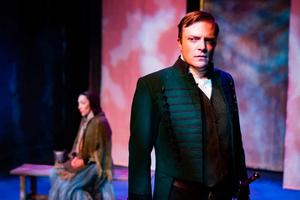Review: LOVERS' VOWS at We Happy Few

Kudos to We Happy Few artistic director Kerry McGee for researching "obsessively" the works of female playwrights of the 17th and 18th century, and for finding one in particular that can speak to modern audiences with some verve and relevance.
Elizabeth Inchbald's "Lovers' Vows," currently being presented by the company at the Capitol Hill Arts Workshop, had not been entirely lost to history. It's mostly remembered through a mention by no less than Jane Austen in her novel "Mansfield Park." Austen assumed her readers would know the notorious work - it was at once the most controversial entry in London's 1798 theatrical season and the most successful (some things haven't changed).
The reason for the controversy is what makes it interesting today, and tweaked by McGee in an interpretation she directed as well as adapted, it gets some extra pizazz from a few exaggerations into farce, the Americana music of the D.C. band The North Country, and in some dance sequences during the songs that explicate or foreshadow action to come.
The story concerns a destitute woman who had been hiding her secret - that she had a son out of wedlock by someone who became a wealthy baron who cast her aside. Almost immediately the son with a leave from the army in order to get his birth certificate, is shocked to find his mother in such a condition, and is equally shocked to hear of the circumstances of his birth for the first time. Just as coincidentally he runs into the baron, who has his own issues with his daughter who is about to marry a cad but is more drawn to a clergyman.
It's basically a comedy of manners that's enhanced by some sharp performances all around, but when they say We Happy Few, the emphasis is on the few.
What demanded a cast of a dozen or so in the 18th century was accomplished by a cast of just five in the new production. That meant some changes so quick you had to think twice whether someone was supposed to be the same character or someone new - that occurred with Jack Novak's dashing young son, who suddenly became a comically rhyming butler for the baron - was he now an indentured servant instead of a prisoner? (No, as it turns out).
Alex Turner was both the kind-hearted and beaming clergyman - who has the most spectacular move of the performance, bounding over an ottoman - as well as playing a surly landlord at the start.
But the most impressive switch was accomplished by Jessica Lefkow, thoroughly convincing as the poor woman at the story's core, but returning as the dashing cad Count Cassel, proving to be not really the right person for young Amelia (Gabby Wolfe), who is also a cottager's wife with a pronounced accent. The cottager himself is Lee Ordeman, who spends most of the time being the complex Baron Wildenheim, a surprisingly thoughtful character who must change his course to look himself in the eye.
Despite being played broadly at times for enjoyment, there are large parts of "Lovers' Vows" that speak to today - not the least of which being a reckoning of men who have mishandled women.
There's some nice work behind the scenes, with Heather Lockhard's costumes, Jason Aufdem-Brinke's lighting and Jon Reynolds' spare set.
As enjoyable as it is, it would be even more so if the music by The North Country were live instead of recorded. But the space in the Capitol Hill Arts Workshop theater is limited enough to fit the five who play all the roles, let alone the five that comprise the full band.
Running time: About 95 minutes, no intermission.
Photo credit: Jessica Lefkow and Jack Novak in "Lovers' Vows." Photo by Mark Williams Hoelscher.
"Lovers' Vows" continues through Nov. 23 at the Capitol Hills Arts Workshop, 545 Seventh St. SE. Tickets online.
Reader Reviews

Videos

